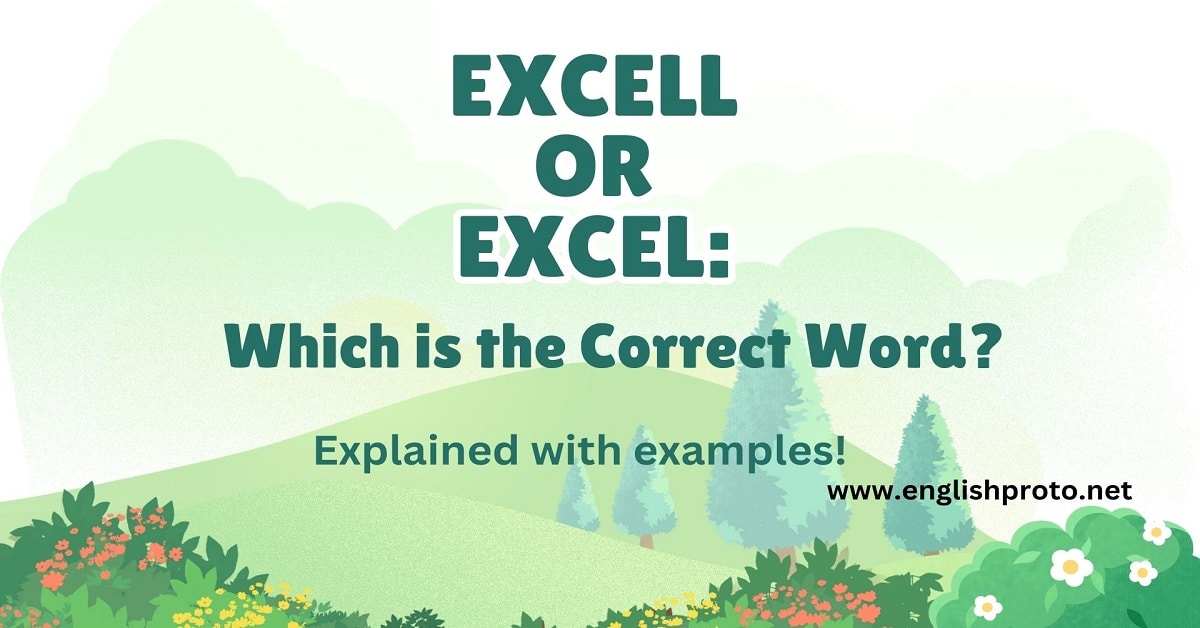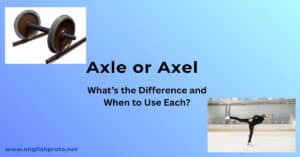Excell or Excel: Which is the Correct Word? If you’ve ever caught yourself wondering whether it’s “Excell” or “Excel,” you’re not alone. This common spelling confusion can trip up even the most experienced writers.
But don’t worry, this article will clear up the mystery once and for all! Understanding the difference between these two terms is more important than you might think.
Whether you’re crafting an email, writing a report, or just trying to get it right, mastering the correct spelling will elevate your writing and help you avoid those pesky mistakes. Keep reading to find out everything you need to know!
⚡ Quick Summary
- Correct Form: The correct spelling is Excel.
- Meaning: To excel means to do something very well, surpassing others in quality, performance, or skill.
- Usage: “Excel” is used as a verb and, in some cases, a noun. It refers to surpassing others or achieving excellence in a particular field.
Key Takeaways:
- “Excel” is the correct word when referring to doing something exceptionally well.
- “Excell” is a misspelling and should be avoided.
- The confusion often arises from similarities in pronunciation, regional spelling preferences, or misunderstandings of the term.
Reasons for Confusion
Many people confuse Excell and Excel because they are homophones—that is, words that sound the same but are spelled differently. While “Excel” is the correct term, it is easy to mistakenly add an extra “l,” leading to “Excell.”
This confusion may also be influenced by:
- Regional Differences: In some areas, people might spell words phonetically, which could result in the incorrect “Excell.”
- Pronunciation: In spoken language, Excel and Excell might sound nearly identical to some speakers, which can lead to confusion when it comes to writing.
- Typographical Errors: In fast-paced typing, the extra “l” might slip in without realizing it, particularly on digital devices that have autocorrect features. This can often go unnoticed in informal communication.
While regional or typographical errors are understandable, it’s important to keep in mind that “Excel” is the standard form in both formal and informal settings.
Detailed Explanation
What Does “Excel” Mean?
To excel means to be exceptionally good at something, to stand out due to superior ability, achievement, or performance. This verb is often used when talking about someone’s success in a particular skill or activity.
- Example Usage:
She excels in mathematics.
John excels at playing the piano.
In addition to its use as a verb, Excel can also refer to something of high quality or achievement, particularly when used in the context of tools or software.
- Microsoft Excel: A widely-used spreadsheet software that allows for data manipulation, calculation, and organization. This is one of the most well-known uses of the term, especially in business and educational environments.
Why the Correct Spelling Matters
Correct spelling is a vital component of professional communication. A misspelled word like Excell can be seen as a typographical error or a sign of carelessness, which can be distracting or even harm your professional image.
In some cases, misused or misspelled words may cause confusion, leading to misinterpretation of your message. Using the correct form, Excel, ensures clarity and helps establish your attention to detail.
⚡ Quick Tip:
Always double-check your writing for common spelling errors, especially with commonly confused words like “Excel” and “Excell”.
Common Errors
Incorrect Form: Excell
The spelling “Excell” is a common mistake, but it does not exist as a recognized word in the English language. This mistake may arise when someone mistakenly adds an extra “l” to the word Excel.
- Incorrect: She Excell in her field.
- Correct: She excels in her field.
Adding an extra “l” in “Excell” creates confusion and should always be corrected to “Excel”.
Why “Excell” Should Be Avoided
- Non-standard Spelling: The word “Excell” does not appear in any reputable dictionary or language resource, and it is not used in any standard grammar or spelling guides.
- Grammatical Issues: Using Excell could lead to misunderstandings and signal a lack of attention to detail. Whether in a professional email or academic paper, it’s always best to stick to the correct spelling, Excel.
Synonyms or Alternatives
While Excel is the standard verb for achieving excellence, there are other words or phrases you can use in various contexts to convey similar meanings:
- Surpass: To exceed or do better than others.
- She surpassed all expectations in her performance.
- Outperform: To do better than others in a particular activity.
- He outperformed his colleagues in the presentation.
- Shine: To do exceptionally well, often in a specific skill or area.
- She really shines when it comes to public speaking.
These alternatives can be used depending on the tone and context of the sentence, but Excel remains the most common term for general use.
Examples in Sentences
Correct Usage of Excel
- He excels in leadership and communication skills.
- Students who excel in math often pursue careers in engineering.
- She has consistently excelled in all of her professional endeavors.
In each of these examples, Excel is used to describe someone performing exceptionally well or achieving outstanding results in a particular area.
Incorrect Usage of Excell
- She Excell in all aspects of design. (Incorrect)
- Correction: She excels in all aspects of design.
- John has Excell at managing large teams. (Incorrect)
- Correction: John has excelled at managing large teams.
As shown in the above incorrect examples, the addition of the extra “l” in Excell creates a non-standard word. Always ensure that you use Excel instead.
Origins and History
The verb Excel comes from the Latin word “excellere,” which means “to rise or stand out.” The term entered the English language around the late 16th century, originally used in the sense of “to surpass in merit or excellence.”
Microsoft Excel, the spreadsheet software, was first released in 1985, named after this very concept of achieving excellence in data organization and manipulation. The program has since become a staple in business, education, and personal finance management.
Conclusion
Understanding the difference between Excel and Excell is crucial for clear and accurate communication. Excel is the correct form, and it means to perform exceptionally well in a given area.
The common misspelling Excell is a simple error, but it can detract from the professionalism of your writing. By focusing on correct spelling and understanding the history and usage of Excel, you can avoid confusion and convey your message with clarity.
Remember: Always double-check your spelling, especially with commonly confused words, to ensure that your writing is as polished and professional as possible.



